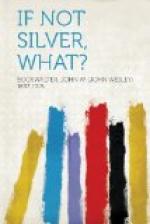Be it noted also that the debt of France is held by the people of France, largely by the industrial class, and especially by the agricultural class, and the interest thereon paid, instead of being a foreign drain, is a perpetual renewal of the current circulation.
One more brief contrast between France and England. No reader of current literature need be told of the appalling prevalence of poverty in Great Britain. As France is a country without poor-houses, so it may be said that England is a land of poor rates and poor unions. The latest official announcement is that the agricultural interest is declining more rapidly than ever before; and in regions where only fifteen years ago the land rented readily at several pounds per acre, statesmen and economists are appalled at the sight of that which so alarmed our New England people a few years ago: the phenomenon of abandoned farms. We are told that there is a revival of industry because British capitalists have withdrawn their money from other countries and will put it in anything rather than have it entirely idle; but the condition of agriculture steadily grows worse.
And have we anything to boast of in our own happy land in comparison with France? Our natural resources so far exceed those of any old country that a comparison would be ridiculous; and the monometallists tell us, when they are trying to prove that gold is not enhanced in value, that, by reason of inventions, a day’s labor will produce at least twice as much as in 1870, and in many lines a great deal more than twice as much. Why, then, does not the laborer receive twice as much as he did in 1870? As wages are labor’s dividend of its own product, and as capital had its dividend then as now, if a day’s labor does not bring the laborer twice what it did, he is wronged; and, considering our resources, if we are not five times as well off as the French people, the only reason can be that we have slighted our opportunities, and blundered most fearfully in our management.




